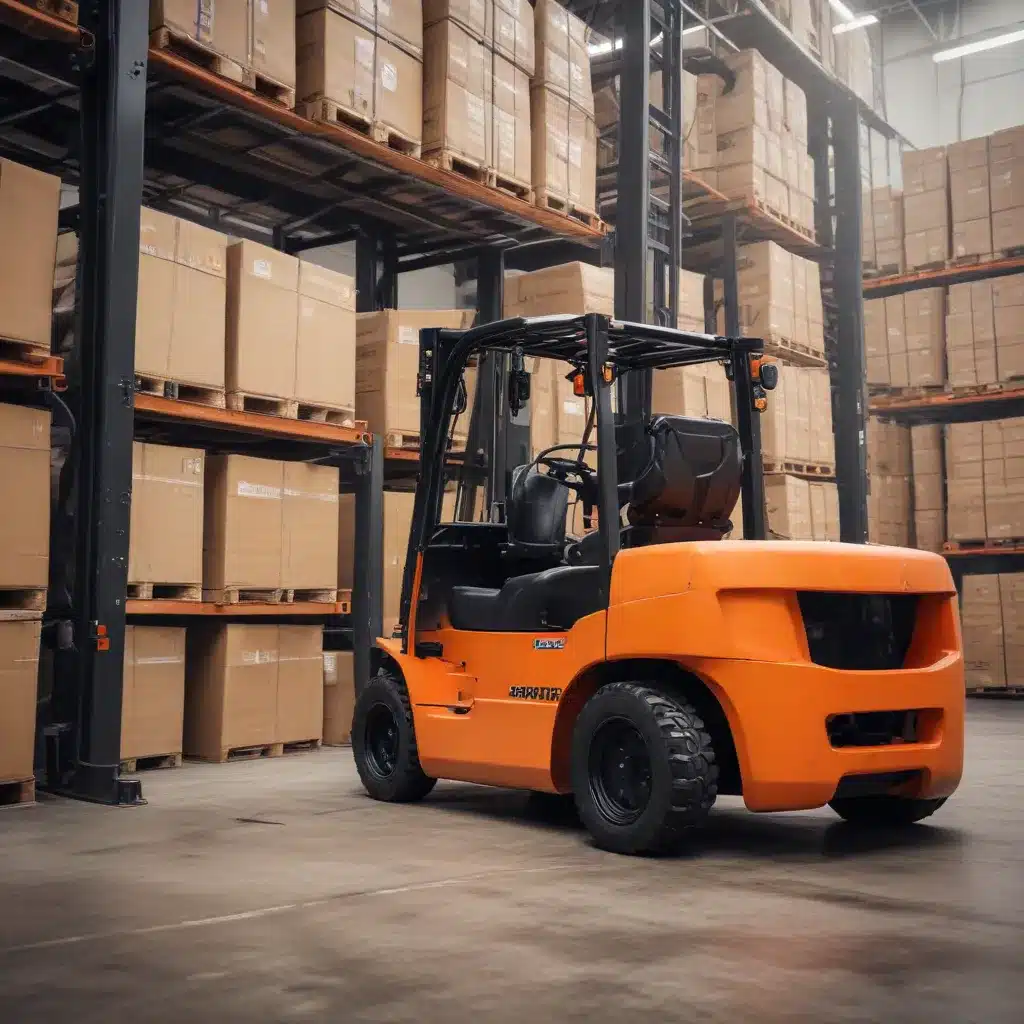
Maintaining Forklift Efficiency Through Seasonal Adjustments
As an industry veteran, I’ve seen how even the slightest changes in weather and climate can significantly impact forklift operations and overall supply chain performance. Proper seasonal forklift care is essential to ensure your materials handling equipment functions at peak efficiency all year round, supporting uninterrupted warehouse productivity and streamlined logistics.
In this comprehensive guide, we’ll explore practical tips and insights to help you navigate the seasonal challenges of forklift maintenance and operations, empowering you to elevate your supply chain performance.
Preparing for Winter: Safeguarding Your Forklifts
When the temperature drops and the winter chill sets in, your forklift fleet faces unique challenges that require specialized attention. Ensuring your forklifts are ready for the cold season is paramount to avoiding costly downtime and maintaining smooth operations.
Battery Maintenance: Frigid temperatures can be harsh on forklift batteries, reducing their charge capacity and lifespan. Implement a comprehensive battery maintenance routine, including regular cleaning, testing, and proper storage during downtime. Consider upgrading to sealed, maintenance-free batteries designed to withstand cold weather.
Fluid Checks: Engine oil, hydraulic fluid, and other critical forklift fluids must be inspected and replaced as needed to prevent freezing or thickening in low temperatures. Consult your forklift manufacturer’s recommendations and switch to winter-grade fluids if necessary.
Tire Traction: Equipping your forklifts with winter tires or chains can greatly improve traction and stability on snowy or icy surfaces, reducing the risk of accidents and improving overall maneuverability.
Operator Training: Emphasize cold weather forklift operation techniques during operator training sessions. Educate your team on proper procedures for starting, warming up, and maneuvering forklifts in winter conditions to enhance safety and efficiency.
Embracing Summer Heat: Keeping Your Forklifts Cool
As the sun shines brighter and temperatures soar, your forklift fleet faces a new set of challenges that require vigilant attention to performance and maintenance.
Cooling System Maintenance: Regularly inspect and service your forklift’s cooling system, ensuring the radiator, hoses, and coolant are in optimal condition. Consider upgrading to a high-performance cooling system designed for hot weather operations.
Ventilation and Airflow: Ensure your warehouse or work environment provides adequate ventilation and airflow to keep forklift engines and operators cool. Implement supplementary cooling systems, such as fans or air conditioning units, in high-traffic areas.
Tire Pressure: Monitor tire pressure closely, as heat can cause significant expansion and pressure buildup. Maintaining the recommended tire pressure will not only improve forklift stability and handling but also extend the life of your tires.
Operator Hydration: Encourage your forklift operators to stay hydrated throughout their shifts, providing access to cool drinking water and emphasizing the importance of maintaining proper hydration levels.
Navigating Seasonal Shifts: Proactive Maintenance Strategies
Adapting your forklift maintenance strategies to accommodate seasonal changes is essential for preserving the longevity and performance of your materials handling equipment.
Preventive Maintenance Schedules: Review your forklift maintenance schedules and adjust them based on seasonal factors. For example, increase the frequency of fluid changes, inspections, and component replacements during the winter and summer months to address the unique challenges of those seasons.
Specialized Inspections: Incorporate seasonal-specific inspections into your maintenance routines. Check for signs of wear, damage, or performance issues that may be exacerbated by temperature extremes, such as battery degradation, hose cracking, or tire wear.
Operator Vigilance: Empower your forklift operators to be your first line of defense against seasonal problems. Encourage them to report any unusual behavior, noises, or performance issues promptly, allowing you to address them before they escalate.
Spare Parts Inventory: Maintain a well-stocked inventory of essential seasonal forklift parts, such as winter tires, cooling system components, and battery chargers. This will enable you to respond quickly to any issues that arise, minimizing downtime and ensuring your fleet is always ready for the changing conditions.
Embracing Technological Advancements
As the forklift industry continues to evolve, embracing technological advancements can significantly enhance your seasonal forklift care and overall supply chain performance.
Telematics and Sensor Integration: Integrating your forklift fleet with telematics systems and sensor technology can provide real-time data on performance, usage, and maintenance needs. This information can help you proactively address potential issues before they impact your operations.
Predictive Maintenance: Leveraging advanced analytics and machine learning algorithms, predictive maintenance solutions can forecast when forklift components are likely to fail, enabling you to schedule timely repairs and prevent unplanned downtime.
Automated Fault Detection: Modern forklift models may feature built-in fault detection systems that can identify and alert you to potential problems, such as overheating, battery issues, or hydraulic system malfunctions. Utilize these features to stay ahead of maintenance needs.
Remote Monitoring and Control: Advancements in wireless technology allow you to monitor and control your forklift fleet remotely, enabling you to make adjustments and respond to issues from anywhere, even during extreme weather conditions.
Conclusion: Elevating Your Supply Chain Through Seasonal Forklift Care
Maintaining peak forklift performance and efficiency throughout the year is essential for ensuring your supply chain operates at its best. By implementing the strategies and best practices outlined in this guide, you can safeguard your materials handling equipment, optimize operations, and deliver uninterrupted service to your customers, even in the face of seasonal challenges.
Remember, proactive maintenance, operator training, and embracing technological innovations are the keys to boosting your supply chain performance and staying ahead of the competition. Invest in your forklift fleet’s seasonal care, and reap the rewards of a more resilient, efficient, and productive logistics operation.
For more information on forklift reviews, safety guidelines, maintenance tips, and industry trends, be sure to visit Forklift Reviews. Our team of experts is dedicated to providing the insights and resources you need to elevate your materials handling operations.

